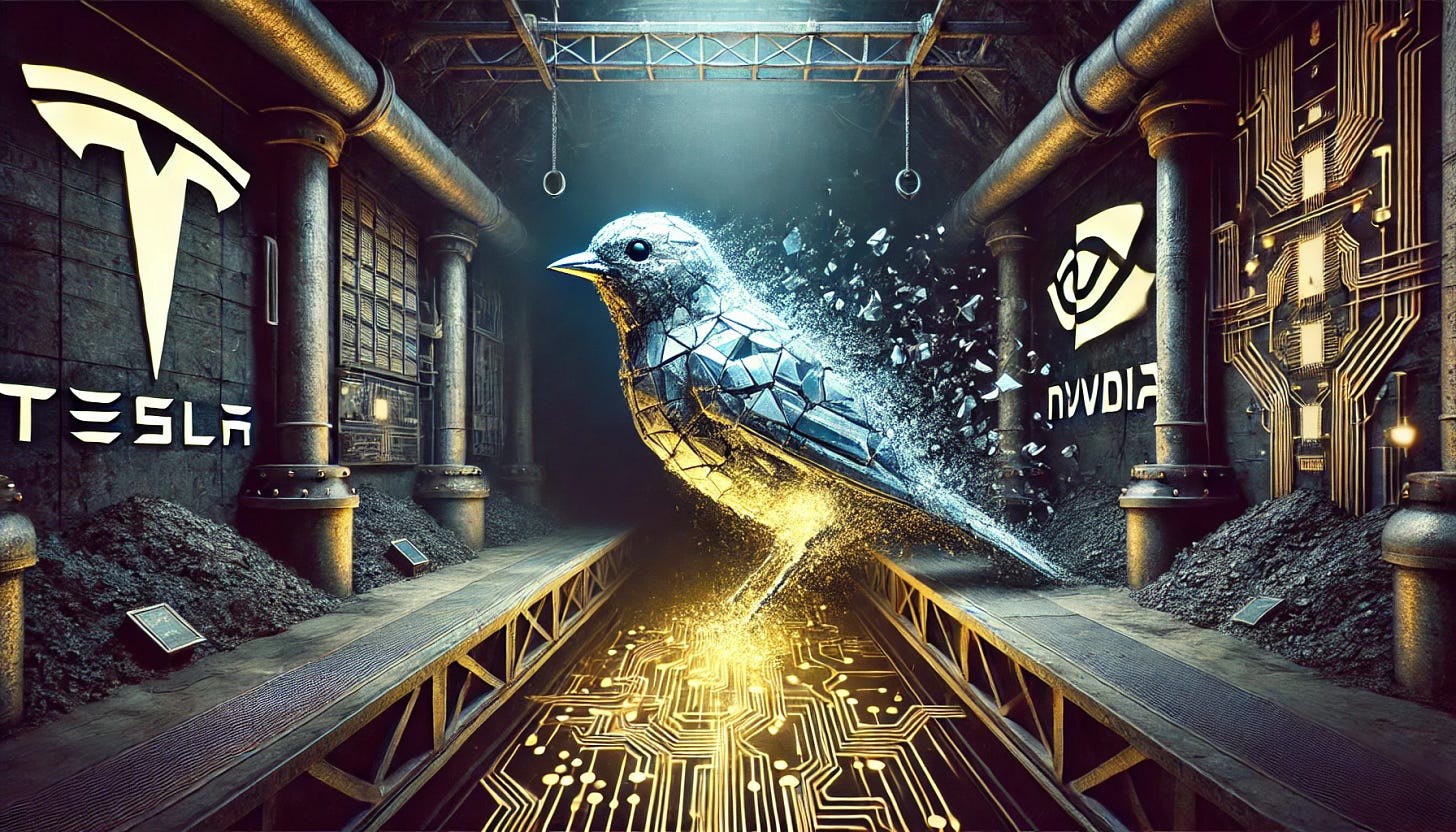DeepSeek, Tesla & The Canary in the Coal Mine: The Shift to a Decentralized Economy
In the land of the blind, the one-eyed man is king...
The $593 billion NVIDIA wipeout wasn't a glitch—it was a warning.
And Tesla? It's not Apple. It's Blackberry. We all know how that ended.
The recent $593 billion market wipeout of NVIDIA, triggered by DeepSeek's AI breakthrough, isn't just a tech market correction—it's a canary in the coal mine for overinflated monopolies across EVs, food, and retail.
🚨 Is Tesla next? DoorDash? McDonald's?
The economic model that failed Uber and Lyft may soon fail corporate food, delivery, and big-box retailers. Let's break down why.
1️⃣ Tesla's Market Hype vs. Reality
🚨 The Most Overvalued Automaker in History
Tesla's $1.28 trillion market cap is an illusion.
📊 The Numbers Don't Lie:
💰 Tesla P/E: 109.14x
🚗 Toyota P/E: ~10x
🔧 Ford P/E: ~7x
⚡ GM P/E: ~6x
Revenue vs. Market Cap:
Tesla: 0.076
Toyota: 7.9
Ford: 4.4
GM: 3.2
🚀 Reality Check: Tesla is worth more than Toyota, Ford, and GM combined—despite selling far fewer cars. The hype machine is running out of fuel.
🔹 DeepSeek, NVIDIA & the AI Market Collapse: A Canary in the Coal Mine
DeepSeek's ability to bypass U.S. restrictions and train AI models using older NVIDIA chips led to an 18% stock drop for NVIDIA, wiping out $593 billion in market value.
This isn't an isolated event—it's a warning sign.
AI, EVs, and tech stocks have inflated market valuations detached from real-world fundamentals.
Could Tesla be next in line? What about food monopolies, fast food franchises, and big-box retailers?
🚨 Leverage Point: The same forces that disrupted Uber/Lyft may soon dismantle DoorDash, Uber Eats, and corporate fast food.
2️⃣ The Domino Effect: Uber, Lyft, & the Collapse of Extractive Gig Work
Worker-owned rideshare co-ops are already eating into Uber and Lyft's market share.
📊 What Happened to Uber & Lyft?
Denver's Driver Co-op saw 15% quarter-over-quarter growth.
Uber/Lyft's take rate (50%) makes them unsustainable against worker-owned competition.
🚨 What's Next? Is the Food Delivery Bubble About to Pop?
DoorDash and Uber Eats are vulnerable as worker-owned food delivery networks cut corporate fees and raise worker pay.
Could fast food franchises see revenue collapse as food co-ops and direct-to-consumer models bypass corporate chains?
📌 Final Thought: The economic model that failed Uber and Lyft may soon impact DoorDash, McDonald's, and Walmart.
3️⃣ Political Reality: Monopolies vs. Worker-Owned Power
Corporate lobbying distorts policy, suppressing worker-owned competition. The solution? Direct political engagement.
📌 Strategic Shifts Needed:
✅ Elect cooperative leaders to city councils & state legislatures.
✅ Advocate for municipal investments in worker-owned businesses.
✅ Break anti-competitive policies that favor monopolies.
🏛 Key Insight: If we don't shape the system, billionaires will.
4️⃣ Worker-Owned Co-Ops: The Hidden Economic Weapon
🔹 Denver's Driver-Owned Rideshare Model is proving a point.
Drivers keep 85%–90% of fares (vs. ~50% with Uber/Lyft).
Growing 15% per quarter in Denver alone.
🚀 The Bigger Picture: What happens when co-ops refuse to buy Tesla vehicles?
Could Tesla's rideshare market collapse overnight—and BYD, Honda, and Toyota become the fleet of choice?
💡 Final Thought: Could the biggest threat to Tesla be worker-owned businesses instead of another corporation?
The Path Forward: Building a Decentralized Future
In her seminal work Leverage Points: Places to Intervene in a System, Donella Meadows outlined where real systemic change happens. Small shifts in power structures—ownership, incentives, and policy—can trigger massive transformations.
📉 Leverage Point 1: Shift the Narrative
Increase awareness of worker-owned alternatives.
Expose Tesla's reliance on corporate subsidies.
📈 Leverage Point 2: Change the Rules
Advocate for cooperative-friendly policies.
Push for tariff reforms to allow fair EV competition.
📡 Leverage Point 3: Redefine Success
Redirect EV subsidies to worker-owned transportation networks.
Reframe success from shareholder profits to community well-being.
📊 Projected Worker-Owned EV Market Share (2030): 12% of U.S. fleet.
🎯 The Hidden Pattern Most Miss: While everyone focuses on Tesla's EV dominance, they're missing the bigger shift: the rise of community-owned transportation networks that could make corporate fleet ownership obsolete. It's not about the cars—it's about who owns them.
🔥 The revolution isn't coming—it's already here.
👉 Which corporate giant do you think falls next? Drop your prediction below.
Want more deep dives into the decentralized future?
📩 Subscribe to join the movement
💡 Book a strategy call to future-proof your business
🤝 DM to explore collaboration opportunities
🚀 The AI Kitchen is open. Let's cook. 🍽️





They will crash the economy. It’s our job to be set up with the next economy.
The telling takeaway from the TikTok / Red Book moment - Americans directly speaking to average Chinese - was Americans learning that China has a better standard of living on 20% of American GDP. GDP is a false measurement because it includes the billionaires in the average. If we’re having coffee and Elon joins us, our table’s GDP (average) goes through the roof. Elon leaves, and what changed in our finances?
We need new metrics that reveal economic actualities, very simply, that everyone can understand. Then repeat, repeat, repeat relentlessly. There is the battle. If we can ac-count for our situation truly, it’s very clarifying. A problem is half solved by setting it up properly - like a fifth grade arithmetic word problem. From there solutions flow.
I’m pretty convinced that if we were all as smart as fifth graders, and acted on that, we’d be way better off.